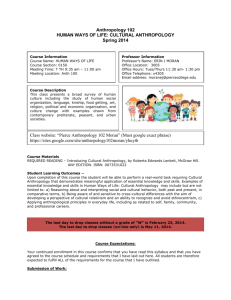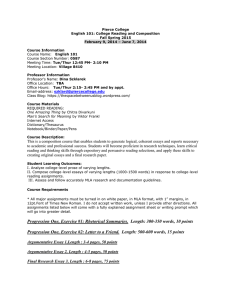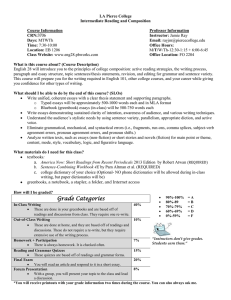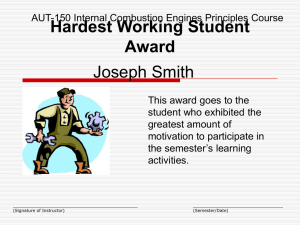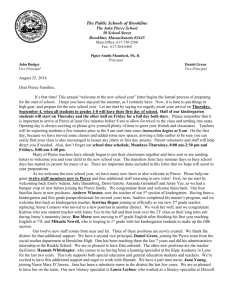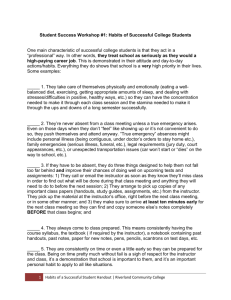PSYC41_S14_0614_TH
advertisement
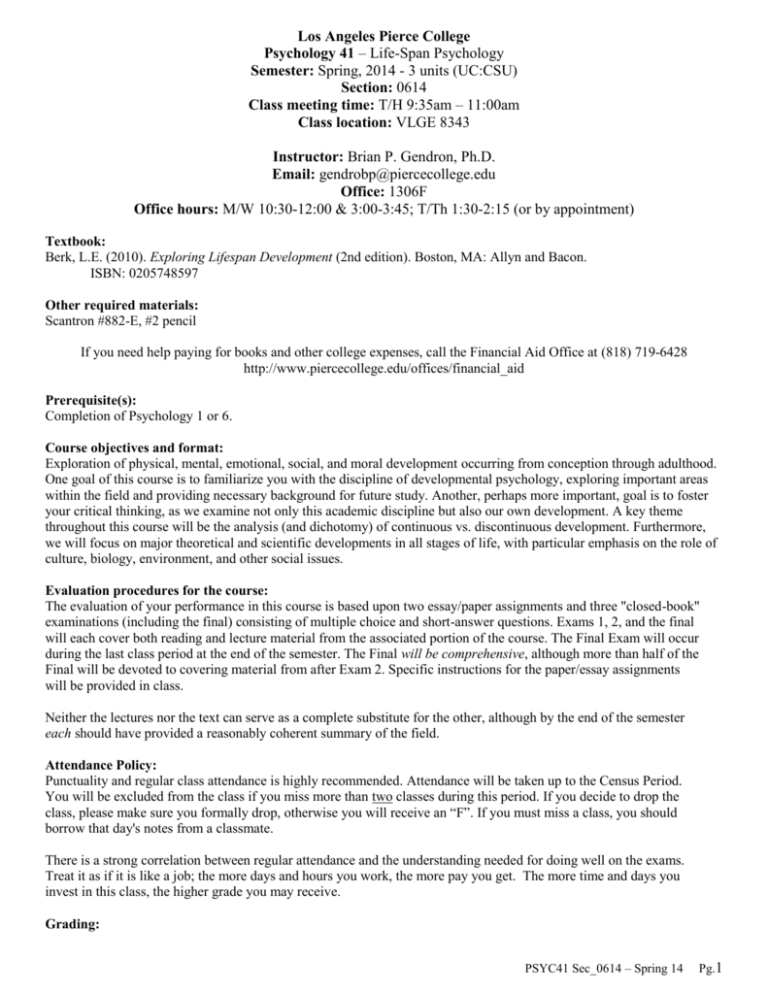
Los Angeles Pierce College Psychology 41 – Life-Span Psychology Semester: Spring, 2014 - 3 units (UC:CSU) Section: 0614 Class meeting time: T/H 9:35am – 11:00am Class location: VLGE 8343 Instructor: Brian P. Gendron, Ph.D. Email: gendrobp@piercecollege.edu Office: 1306F Office hours: M/W 10:30-12:00 & 3:00-3:45; T/Th 1:30-2:15 (or by appointment) Textbook: Berk, L.E. (2010). Exploring Lifespan Development (2nd edition). Boston, MA: Allyn and Bacon. ISBN: 0205748597 Other required materials: Scantron #882-E, #2 pencil If you need help paying for books and other college expenses, call the Financial Aid Office at (818) 719-6428 http://www.piercecollege.edu/offices/financial_aid Prerequisite(s): Completion of Psychology 1 or 6. Course objectives and format: Exploration of physical, mental, emotional, social, and moral development occurring from conception through adulthood. One goal of this course is to familiarize you with the discipline of developmental psychology, exploring important areas within the field and providing necessary background for future study. Another, perhaps more important, goal is to foster your critical thinking, as we examine not only this academic discipline but also our own development. A key theme throughout this course will be the analysis (and dichotomy) of continuous vs. discontinuous development. Furthermore, we will focus on major theoretical and scientific developments in all stages of life, with particular emphasis on the role of culture, biology, environment, and other social issues. Evaluation procedures for the course: The evaluation of your performance in this course is based upon two essay/paper assignments and three "closed-book" examinations (including the final) consisting of multiple choice and short-answer questions. Exams 1, 2, and the final will each cover both reading and lecture material from the associated portion of the course. The Final Exam will occur during the last class period at the end of the semester. The Final will be comprehensive, although more than half of the Final will be devoted to covering material from after Exam 2. Specific instructions for the paper/essay assignments will be provided in class. Neither the lectures nor the text can serve as a complete substitute for the other, although by the end of the semester each should have provided a reasonably coherent summary of the field. Attendance Policy: Punctuality and regular class attendance is highly recommended. Attendance will be taken up to the Census Period. You will be excluded from the class if you miss more than two classes during this period. If you decide to drop the class, please make sure you formally drop, otherwise you will receive an “F”. If you must miss a class, you should borrow that day's notes from a classmate. There is a strong correlation between regular attendance and the understanding needed for doing well on the exams. Treat it as if it is like a job; the more days and hours you work, the more pay you get. The more time and days you invest in this class, the higher grade you may receive. Grading: PSYC41 Sec_0614 – Spring 14 Pg.1 Examinations 1 and 2 will each count for 250 points towards your final grade. The Final Exam will count for 300 points. Essay/Assignment 1 and 2 will each count for 100 towards your final grade (bringing the total to 1000 points). Course grades will be based upon the total number of points earned on these exams and assignments. In rare cases, consideration may be given for improvement across the semester. Course grades will be A, B, C, D or F; the requirements for each letter grade are presented below: 90-100% (A) 80-89% (B) 70-79% (C) 60-69% (D) <59% (F) Student Learning Outcomes: I. Students will be able to differentiate among the core theoretical approaches to understanding human development offered by stage theorists (Piaget: Cognitive, Erikson: Psychosocial) and incremental change theorists (Watson: Behaviorism, Bandura: Social Learning Theory). II. Students will be able to identify the difference between Quantitative Research and Qualitative Research and differentiate among classic developmental research designs (longitudinal, cross-sectional). III. Students will be able to distinguish among the various approaches to understanding personality development (normative stage models, trait models “The Big 5”, timing of events model/social clock, typological models). IV. Students will be able to apply their understanding of the Nature/Nurture issue to various issues in human development, such as intelligence/intellectual abilities, aggression, psychological disorders, sexual orientation, cognitive development, twin studies, etc. V. Students will be able to demonstrate their understanding of the various temperament types, attachment styles, and parenting styles by applying that understanding through an examination of hypothetical scenarios. Planning: Planning your workload to accommodate the scheduled exams for this class with your other course(s) is your responsibility. It is strongly recommended that you go over your class notes and keep up with the reading on a regular basis. You should then have a little time before each exam to spend on reviewing of the material. All students are expected to take exams on the scheduled dates. Those who are unable to take an exam for any reason (e. g., illness or other unforeseeable events) must contact the instructor as soon as possible. Since make-up exams are not given, the instructor reserves the right to drop only one exam and use the final exam grade to substitute for that one missed exam. If the instructor is to honor this, the student MUST provide substantial physical evidence (e.g., doctor’s note) leading to their absence, otherwise the missed exam will count as a zero (0). NOTE: This only applies to one missed exam with substantial proof of absense. Cell phones, computers, and other devices must be switched to “silent” or turned-off. This includes “vibrate” which can be heard as well. In the past, the instructor deducted exam points from individuals when such items had “goneoff” in class. If you have a need to leave your cell phone on, please discuss this matter with the instructor ahead of time. In-class participation is strongly encouraged, including actively participating in group activities, sharing a relevant experience with the class, or asking me relevant questions. However, talking to your friends in class, or otherwise disturbing your fellow classmates, is not permitted. Disobedient, disruptive or disorderly behavior exhibited by any student may result in disciplinary action in accordance with District policies and procedures. Action may include, but is not limited to expulsion from class. Course Website: Pierce Online (http://moodle.piercecollege.edu/) will be used to post relevant lecture slides, assignment details, and grade information, at the instructor’s discretion. PATH This course was identified as a PATH course leading to an OPTIONAL minor in Civic Engagement at CSUN. There are PSYC41 Sec_0614 – Spring 14 Pg.2 five paths a student may take (Aesthetics and Culture, Health and Wellness, Global Studies, Social Justice, and Sustainability) and this course fulfills the Health and Wellness Path. Please inquire with your instructor if you are interested in additional courses offered at Pierce to fulfill this Path. Plagiarism and Academic Dishonesty The faculty and administration of Pierce College are committed to the belief that honesty and integrity are integral components of the academic process. The College expects students to be honest and ethical at all times in their pursuit of academic goals. Students who violate the code of academic conduct by which the College maintains its academic integrity will be dealt with in a manner reflecting the seriousness of these violations. I. Violations of academic honesty and integrity occur when a student participates in any act in which he/she uses deception or fraud while performing an academic activity. Violations include, but are not limited to, the following: Using study aids such as calculators, tape recorders or notes, when not authorized by the instructor. Cheating on examinations, assignments or experiments (allowing another student to copy one’s answers or copying the answers of other students; exchanging information by any means, including verbal exchanges, sign language, hand signals, secret codes, passed notes, creation of a distraction for the purpose of cheating; changing answers on a previously scored test, assignment or experiment; inventing information and/or data.) Allowing another student to assume one’s identity in order to fulfill an assignment or take a test. Submitting for a grade the words, ideas, and/or written work (including laboratory notes and drawings) of another person without giving due credit to that person. This includes purchased papers or papers written by other students. Falsifying or attempting to falsify attendance records and/or grade rosters. Conspiring with other students to commit any of the above behaviors. II. Consequences for any offense against academic honesty and integrity may include: An “F” or a “0” on the examination or assignment. Suspension from the class and other sanctions and/or penalties authorized by the Board of Trustees for violations of the District Code of Conduct. A record of the student’s violation placed in the student’s disciplinary file. Students are required to be honest and complete their own work at all times (homework, class work, quizzes, tests, etc.). Additional information about plagiarism can be found at www.plagiarism.org or through various websites on the Internet. Essential Resources (suggested wording included in red) Academic Counseling Services – 818.719.6440 Student Services Bldg, 1st floor Academic counselors are available to assist you with many of your educational needs such as help in clarifying your values and goals; develop a student education plan (SEP); interpret articulation agreements with other colleges and universities, and much more. ASSIST.org – www.assist.org ASSIST is an online student-transfer information system that shows how course credits earned at one public California college or university can be applied when transferred to another. ASSIST is the official repository of articulation for California’s public colleges and universities and provides the most accurate and up-to-date information about student transfer in California. Associated Students Organization – 818.719.6411 The Pierce College student government organization supports the growth of Pierce College through active involvement with students, faculty, and staff. Our goal is to create a better environment for an overall academic experience through leadership and club participation. Book Store – 818.710.3303 College Services Bldg The Pierce College Bookstore provides for the sale of books and supply requirements connected with the academic programs of the college. Text book information is available online at www.piercebookstore.com. Career Center – 818.710.4126 Student Services Bldg 1st floor The mission of the Pierce Career Center is to educate and to serve the students of Pierce College in the career education, planning and development processes. Career Center services and resources provide assistance to students with the exploration of career options, the cultivation of a comprehensive employment and education plan, and the enhancement of job search techniques and strategies. Center for Academic Success – 818.719.6414 Library Learning Crossroads Bldg, 1st floor The CAS is committed to helping students in need of academic support acquire the skills and tools necessary to meet their PSYC41 Sec_0614 – Spring 14 Pg.3 individual academic, vocational, or personal goals. All tutoring services are free to currently enrolled Pierce College students. Copy Tech – 818.710-3303 Bookstore Complex Pierce College's High-Tech Document Production Center where students can make it, print it, and copy it, at the CopyTech! Copy Tech also issues picture ID cards to new students upon presentation of proof of enrollment (registration/fee receipt.) Equal Opportunity Programs and Services – 818.719.6422 Student Services Bldg, 2nd floor EOP&S is a state-funded support program designed to assist qualified low-income and educationally disadvantaged students in completing their educational goals with the assistance of financial and student support services. It is an invitational program open only to those who qualify and commit to participate in the program. Financial Assistance – 818.719.6428 Student Services Bldg, 1st floor If you need help paying for books and other college expenses, please contact the Financial Aid Office. Visit them on the web at http://www.piercecollege.edu/offices/financial_aid GAIN/CalWorks – 818.719.6400 Student Services Bldg, 2nd floor The GAIN/CalWORKs program serves all CalWORKs students attending Pierce College. A variety of services designed to support your educational, career and personal goals is offered, such as advocacy for child care, student education plans (SEP), work-study opportunities, child care in the campus Child Development Center for eligible children, and much more. Health Center – 818.710.4270 Student Services Bldg, 2nd floor The Pierce College Student Health Center is committed to delivering expert medical care to students. Each student is given professional and cost effective medical attention. All registered students, regardless of insurance, are eligible for the same no charge or low cost care. Personal Counseling is also available to all currently enrolled students. The Pierce College Student Health Center is committed to providing care to support your academic and personal well being. Library – 818.710.2833 Library Learning Crossroads Bldg, 2nd floor The Pierce College Library serves all currently enrolled students, college faculty and staff, and members of the community. The library is a comfortable place to study, to investigate a topic of interest, or to enjoy reading a current book, periodical, or magazine. Please feel free to ask for assistance in using the library; a reference librarian is available to help you with your research questions. Pass-No-Pass Courses Did you know you can take courses on a pass-no pass basis? Pass-No Pass is a great way to maintain your GPA while you take classes that you may not be particularly strong in. Any questions about Pass-No Pass check with an academic counselor. Special Services – 818.719.6430 Student Services Bldg, 1st floor Students with disabilities, whether physical, learning, or psychological, who believe that they may need accommodations in this class, are encouraged to contact the office of Special Services as soon as possible to ensure that such accommodations are implemented in a timely fashion. Authorization, based on verification of disability, is required before any accommodation can be made. Transfer Center – 818.710.4126 Student Services Bldg, 1st floor The mission of the Pierce College Transfer Center is to help students successfully transfer to a four year institution. The Transfer Center offers aid to students in the transfer process to ensure a smooth and positive transition. Veterans Office – 818.710.3316 Student Services Bldg, 2nd floor The mission of the Pierce College Veterans Office is to provide a supportive environment for veterans and to assist them with the services they need to receive VA benefits and to successfully complete their educational goal at Pierce College. The Veterans Office is designed as a liaison between you as a veteran and the Veterans Administration. Our Veterans staff will forward all documents required by the Veterans Administration directly to the Muskogee Regional Office. Our email contact is pierce-veteran@piercecollege.edu PSYC41 Sec_0614 – Spring 14 Pg.4 Spring 2014 Calendar It is the student’s responsibility to read and adhere to the deadline dates listed below: REGISTRATION DATES New student on-line applications accepted for Spring 2014 semester In person applications accepted Students may add open classes on-line before the first day of the semester (Add Permits must be obtained from class instructor at the beginning of the term) October 1, 2013 – January 31, 2014 February 10, 2014 February 9 GENERAL CALENDAR DATES Day and Evening Classes Begin Saturday Classes Begin Students may file petitions for degrees and certificates to be awarded in fall 2014 Petitions for Pass/No Pass grading accepted for semester-length classes (Pass/No Pass petitions for short-term classes are accepted during the first two weeks of class) Last Day of Instruction Final Examinations Fall Semester grades available online beginning (Grades will become available as they are submitted by instructors) February 10, 2014 February 22, 2014 March 3 to May 30, 2014 February 10-20, 2014 June 2, 2014 June 3 - 9 June 8, 2014 DEADLINES - LAST DAY TO: LAST DAY TO CHANGE RESIDENCY STATUS FROM NON-RESIDENT TO RESIDENT FOR SPRING 2014 (WITH THE SUPPLEMENTAL RESIDENCY QUESTIONNAIRE AND SUPPORTING DOCUMENTS) LAST DAY TO ADD CLASSES (On-line) LAST DAY TO ADD CLASSES (In person at Admission and Records with Instructors Add Permit) LAST DAY TO SUBMIT AUDIT CARDS LAST DAY TO DROP OR CHANGE CLASSES WITHOUT INCURRING FEES* LAST DAY TO CLAIM A REFUND OF ENROLLMENT FEES AND NON-RESIDENT TUITION* LAST DAY TO DROP CLASSES WITHOUT A GRADE OF “W”* LAST DAY TO REQUEST CREDIT-BY EXAM LAST DAY TO DROP CLASSES ON-LINE ONLY* (Will show as a “W”) (Students who drop classes from February 24 to May 11 (on-line) will have a “W” recorded on their permanent record) February 07 February 09 February 21 February 21 February 23 February 23 February 23 April 13 May 11, 2014 *These dates apply to courses beginning the first day of the term and semester-length classes. See instructor for other deadlines for late started and short-term classes. FIRST DAY TO: Apply online for Winter 2014 Apply online for Spring 2014 Apply online for Summer 2014 Apply online for Fall 2014 October 1, 2013 October 1, 2013 October 1, 2013 October 1, 2013 INTERNATIONAL STUDENT APPLICATION DEADLINES NEED F-1 VISA (Out of Country) HAVE F-1 VISA (Transfers) HOLIDAYS - NO CLASSES Martin Luther King Jr. Day, college closed Presidents’ Birthdays, college closed Cesar Chavez Day, college closed Spring Break Memorial Day, college closed Non instructional day, college services open October 15, 2013 December 1, 2013 January 20 February 14 - 17 March 31 April, 7-13 May 26 May 27 College Admissions Office is not open Saturdays PSYC41 Sec_0614 – Spring 14 Pg.5 Course Schedule: The following is a general list of topics to be covered during the semester. The instructor reserves the right to make changes to the schedule based on the flow of this particular section or in order to accommodate for specific items that are of interest to the students. Date Lecture Topic Reading Assignment(s) February March April May June 11 Introduction to Life-Span Psychology Chapter 1 13 History, Theory, and Research Strategies Chapter 1 18 Biological & Social Foundations (Nature vs. Nurture) Chapter 2 20 Prenatal Development, Birth, and the Newborn Baby Chapter 3 25 Physical Development in Infancy and Toddlerhood Chapter 4 27 Cognitive Development in Infancy and Toddlerhood Chapter 5 4 Review/Catch-up 6 EXAM 1 Chapters 1-5 11 Emotional & Social Development in Infancy and Toddlerhood Chapter 6 13 Physical and Cognitive Development in Early Childhood Chapter 7 18 Emotional and Social Development in Early Childhood* Chapter 8 20 Physical and Cognitive Development in Middle Childhood Chapters 9 25 Emotional and Social Development in Middle Childhood Chapter 10 27 1 Review/Catch-up Review/Catch-up 3 EXAM 2 Chapters 6-10 8 [NO CLASS] [Spring Break] 10 [NO CLASS] [Spring Break] 15 Physical and Cognitive Development in Adolescence Chapter 11 17 Emotional and Social Development in Adolescence Chapter 12 22 Physical and Cognitive Development in Early Adulthood Chapter 13 24 Emotional and Social Development in Early Adulthood** Chapter 14 29 Physical and Cognitive Development in Middle Adulthood Chapters 15 1 Review/Catch-up 6 8 Review/Catch-up EXAM 3 Chapters 11-15 13 Emotional and Social Development in Middle Adulthood Chapter 16 15 Physical and Cognitive Development in Late Adulthood Chapters 17 20 Emotional and Social Development in Late Adulthood Chapter 18 22 Death, Dying, and Bereavement Chapter 19 27 [NO CLASS] [Non-instructional day] 29 Review/Catch-up 5 FINAL EXAM 9:00am – 11:00am *Essay 1 due at the start of class Chapters 1-19 **Essay 2 due at the start of class PSYC41 Sec_0614 – Spring 14 Pg.6
